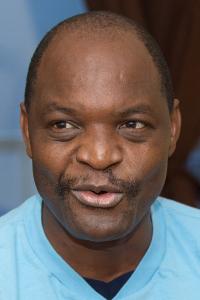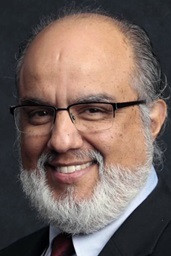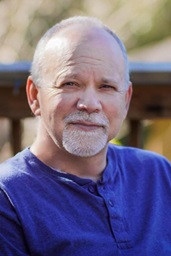
Photo of the Rev. Lloyd T. Nyarota by Mike DuBose, United Methodist News Service.
It is good and great that prayer is taking a central role in the work of the Commission on a Way Forward. It is my humble opinion that the commission needs to take a reconciliatory approach.
For The United Methodist Church to move forward, we need to reconcile as a denomination about the years we have spent battling each other. Then the church can focus on critical Christian ministries.
Reconciliation takes dialogue and partnership to a new level. It invites us to reflect on what harm has been done by imposing stereotypes on each other instead of opening ourselves to see what the other had to offer.
We start by lamenting those harms so we can begin to move forward.
I reflect on why God decided to become human in order to serve us. God is humbling himself and becoming vulnerable. We are now in the season of Lent and soon we will celebrate Maundy Thursday, Good Friday and Easter — when we witness how God through Christ was vulnerable.
As the people called United Methodists, we are going through a special time of prayer as we await the work of a commission set by the bishops to look and suggest a way forward for our denomination that will keep us together despite deep differences around homosexuality.
Yes, there is a rift in our church. We are divided and many are hurting.
As I reflected on this, I started thinking about how I was raised in the village in Zimbabwe. The culture there is communal. We were always taught that we all need each other.
When you meet someone — whether you know them or they are strangers — you greet them. You cannot just pass someone without checking on them. That includes people who do not agree with you in many ways.
As you greet, you are supposed to communicate to them sincerely that you wish them well, because in so doing that is how you can be well yourself.
“Ndinofara hangu kana imi Muchifarawo,” translated means, “I am happy on condition you yourself is happy.”
I was taught my happiness depends on the community and that when others are hurting there is no way you can be happy. Each member of the community has a responsibility to make others happy in order to keep and maintain their own happiness.
We are each other’s keepers.
Sometimes it's so easy to hate people you don’t really know. All you have is your stereotypes and resentments.
I think as United Methodists, it is time we to get to know each other within our connectional global community, so that we would start reconciling with each other.
This can only happen if our commission takes a reconciliation approach as a way forward for our denomination.
I am thinking we have been shouting to each other rather than listening to each other. The question is, “Is reconciliation possible?” The answer is, "Reconciliation is the epicenter of Christ’s gospel."
Maybe we need to ask ourselves what is our core message as people called United Methodists.
God expects us to focus on the challenges facing the world. The issues of human life are the issues that bother God. Those issues bothered God and he incarnated to become human so that he could journey with us.
Maybe as a denomination we have become hung up on our private matters — leaving God’s matters aside and unattended.
We have put all our energy into questions about homosexuality and abortion and all we have got out of it is hurting and hating each other. Now, we are divided and cannot see our future.
I am not saying these issues are unimportant, but they are not the core issues of Scripture.
For me as an African person, I think the core issues of Scripture are human welfare, political and economic justice.
Justice is central to the ministry of Jesus and to the prophetic tradition of the Old Testament. Justice is central to the Torah tradition that lies behind that prophetic tradition.
I think we have learned, for comfort’s sake, to misread the Bible.
Maybe sometimes we think the Bible is about personal happiness, personal well-being, being with God when you die and being privately moral.
The Bible is not generally about such matters. When you read the books of the prophets through and through, they are talking about and proclaiming public morality.
You can open the books of the prophets anywhere and you will find them talking about widows, orphans, immigrants and poor people. They talk about wages, they talk about unjust scales, and they talk about the greed that skews the economy.
They say that injustice will lead to destruction. It is an unavoidable message. So it is just amazing how, in our habitual reading, we have siphoned off the energy from those accent points into stuff that is less demanding and less costly.
Maybe our church must begin to build ourselves into a neighbourly faith community in which all are given access to what is needed for a life of dignity, security and well-being. We need to value our own faith confession, but make room to take seriously the faith confessions of others.
It is open to a new global conventionalism in which nobody, including the United States, is permitted to be a bully.
It means the re-characterization of all our connectional global relationships in ways that are healthy, generative and restorative.
Along with that kind of formal connectional work, what our church needs to be doing is establishing long-term conversational patterns that can reach across continental and racial lines.
We have got to make the kind of commitment that will let us genuinely listen to each other and hear each other’s stories.
I don’t think there is any substitute for that kind of personal interaction, the kind of interaction that lets us find out that people who may seem unlike us actually have narratives that are almost like our own.
Nyarota is a United Methodist elder from Zimbabwe who is now serving a two-point United Church of Canada charge in the province of Alberta. He has served as a consultant for the United Methodist Board of Church and Society.
Like what you're reading? Support the ministry of UM News! Your support ensures the latest denominational news, dynamic stories and informative articles will continue to connect our global community. Make a tax-deductible donation at ResourceUMC.org/GiveUMCom.



